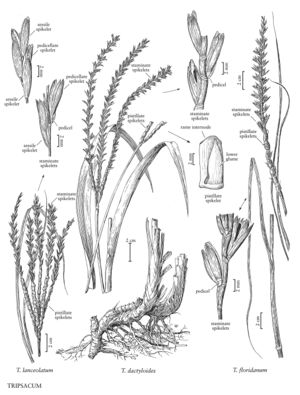Difference between revisions of "Tripsacum dactyloides"
FNA>Volume Importer |
imported>Volume Importer |
||
| Line 16: | Line 16: | ||
-->{{Treatment/Body | -->{{Treatment/Body | ||
| − | |distribution=Conn.;N.J.;N.Y.;Del.;D.C;W.Va.;Fla.;Mass.;R.I.;La.;Tenn.;N.C.;S.C.;Pa.;Va.;Md.;Ala.;Ark.;Ill.;Ga.;Ind.;Iowa;Kans.;Nebr.;Okla.;Tex.;Ohio;Mo.;Mich.;Miss.;Ky. | + | |distribution=Conn.;N.J.;N.Y.;Del.;D.C.;W.Va.;Fla.;Mass.;R.I.;La.;Tenn.;N.C.;S.C.;Pa.;Va.;Md.;Ala.;Ark.;Ill.;Ga.;Ind.;Iowa;Kans.;Nebr.;Okla.;Tex.;Ohio;Mo.;Mich.;Miss.;Ky. |
|discussion=<p><i>Tripsacum dactyloides</i> grows in water courses and limestone outcrops from the central and eastern United States through Mexico to northern South America. Plants from the United States and northern Mexico belong to <i>Tripsacum dactyloides</i> var. dactyloides. They differ from those of the other two varieties in their erect stems and sessile staminate spikelets. Narrow-bladed plants of <i>T. dactyloides</i> from Texas resemble T floridanum, but on transplanting to favorable conditions develop the wider blades characteristic of <i>T. dactyloides</i>. The two species can hybridize; the hybrids are partially sterile.</p><!-- | |discussion=<p><i>Tripsacum dactyloides</i> grows in water courses and limestone outcrops from the central and eastern United States through Mexico to northern South America. Plants from the United States and northern Mexico belong to <i>Tripsacum dactyloides</i> var. dactyloides. They differ from those of the other two varieties in their erect stems and sessile staminate spikelets. Narrow-bladed plants of <i>T. dactyloides</i> from Texas resemble T floridanum, but on transplanting to favorable conditions develop the wider blades characteristic of <i>T. dactyloides</i>. The two species can hybridize; the hybrids are partially sterile.</p><!-- | ||
--><p>Growing <i>Tripsacum dactyloides</i> for forage has proven practical only in South America. It is also used as an ornamental grass, the chief attraction being its foliage.</p> | --><p>Growing <i>Tripsacum dactyloides</i> for forage has proven practical only in South America. It is also used as an ornamental grass, the chief attraction being its foliage.</p> | ||
| Line 35: | Line 35: | ||
|illustrator=Linda A. Vorobik;Hana Pazdírková | |illustrator=Linda A. Vorobik;Hana Pazdírková | ||
|illustration copyright=Utah State University | |illustration copyright=Utah State University | ||
| − | |distribution=Conn.;N.J.;N.Y.;Del.;D.C;W.Va.;Fla.;Mass.;R.I.;La.;Tenn.;N.C.;S.C.;Pa.;Va.;Md.;Ala.;Ark.;Ill.;Ga.;Ind.;Iowa;Kans.;Nebr.;Okla.;Tex.;Ohio;Mo.;Mich.;Miss.;Ky. | + | |distribution=Conn.;N.J.;N.Y.;Del.;D.C.;W.Va.;Fla.;Mass.;R.I.;La.;Tenn.;N.C.;S.C.;Pa.;Va.;Md.;Ala.;Ark.;Ill.;Ga.;Ind.;Iowa;Kans.;Nebr.;Okla.;Tex.;Ohio;Mo.;Mich.;Miss.;Ky. |
|reference=None | |reference=None | ||
|publication title= | |publication title= | ||
|publication year= | |publication year= | ||
|special status= | |special status= | ||
| − | |source xml=https:// | + | |source xml=https://bibilujan@bitbucket.org/aafc-mbb/fna-data-curation.git/src/bb6b7e3a7de7d3b7888a1ad48c7fd8f5c722d8d6/coarse_grained_fna_xml/V25/V25_1658.xml |
|subfamily=Poaceae subfam. Panicoideae | |subfamily=Poaceae subfam. Panicoideae | ||
|tribe=Poaceae tribe Andropogoneae | |tribe=Poaceae tribe Andropogoneae | ||
Revision as of 23:03, 27 May 2020
Plants with short, knotty rhizomes. Culms 1-2(4) m tall, 3-5 mm thick, clumped. Sheaths usually glabrous, occasionally slightly pilose; ligules ciliate; blades 30-75(120) cm long, 9-35(45) mm wide, flat, usually glabrous, tapering to attenuate apices. Terminal inflorescences erect, with (1)2-3(6) rames; rames 12-25 cm. Pistillate spikelets 6-8 mm long, 3-5.5 mm wide. Staminate spikelets all sessile or subsessile; glumes 5-12 mm, coriaceous, blunt, acute, or bifid; pedicels, when present, about 1 mm long, 0.5-0.8 mm wide, triangular in cross section, rigid. 2n = 36, 54, 72.
Distribution
Conn., N.J., N.Y., Del., D.C., W.Va., Fla., Mass., R.I., La., Tenn., N.C., S.C., Pa., Va., Md., Ala., Ark., Ill., Ga., Ind., Iowa, Kans., Nebr., Okla., Tex., Ohio, Mo., Mich., Miss., Ky.
Discussion
Tripsacum dactyloides grows in water courses and limestone outcrops from the central and eastern United States through Mexico to northern South America. Plants from the United States and northern Mexico belong to Tripsacum dactyloides var. dactyloides. They differ from those of the other two varieties in their erect stems and sessile staminate spikelets. Narrow-bladed plants of T. dactyloides from Texas resemble T floridanum, but on transplanting to favorable conditions develop the wider blades characteristic of T. dactyloides. The two species can hybridize; the hybrids are partially sterile.
Growing Tripsacum dactyloides for forage has proven practical only in South America. It is also used as an ornamental grass, the chief attraction being its foliage.
Selected References
None.
